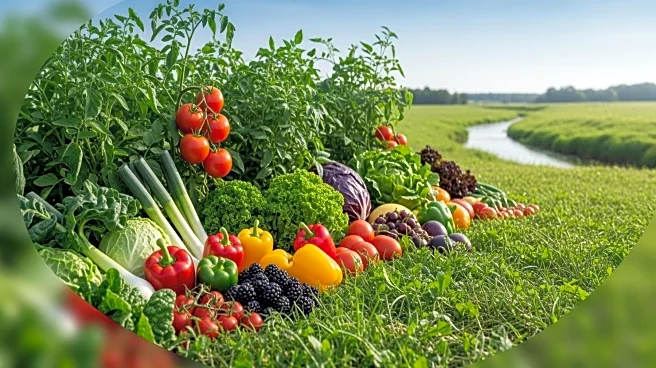What is the story about?
What's Happening?
The global sustainable agriculture market is anticipated to grow significantly, reaching over USD 59.3 billion by 2034, according to a market assessment report. This growth is driven by a compound annual growth rate (CAGR) of 10.7% during the forecast period. Sustainable agriculture encompasses farming systems that prioritize environmentally responsible practices, aiming to minimize ecological harm while ensuring long-term productivity. Regenerative agriculture, a subset of sustainable agriculture, focuses on improving soil health and revitalizing farm ecosystems through water conservation, optimized fertilizer use, and biodiversity enhancement. Despite the momentum, the market faces challenges such as limited public awareness, high initial investment costs, and a shortage of skilled labor.
Why It's Important?
The expansion of the sustainable agriculture market is crucial for addressing environmental concerns such as carbon emissions and declining arable land availability. As the global population continues to grow, there is an increasing need to reduce greenhouse gas emissions, improve soil fertility, and optimize water usage. These factors contribute to the positive trajectory of the market. The shift towards sustainable practices is expected to benefit farmers, industry stakeholders, and policymakers by promoting environmental stewardship and economic viability. However, small and marginal farmers may face difficulties due to lower crop yields and the need for advanced agricultural equipment.
What's Next?
North America is expected to maintain its leading position in the sustainable agriculture market, supported by active corporate engagement and major industry players. The region's growth is bolstered by initiatives such as Danone North America's sustainable farming program. Conversely, the Asia Pacific region is poised for robust growth due to its vast agricultural land resources and governmental support for innovative farming techniques. Future market opportunities may arise from increased public consciousness around soil regeneration and environmental stewardship.
Beyond the Headlines
The development of sustainable agriculture practices has ethical and cultural implications, as it promotes responsible resource management and long-term ecological balance. The transition to sustainable farming methods may also lead to shifts in agricultural policies and consumer preferences, emphasizing the importance of environmental sustainability in food production.















